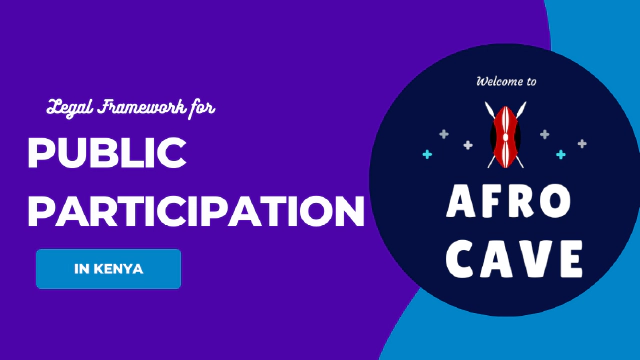Public participation in Kenya is considered a crucial pillar of the Kenyan Constitution. It promotes democracy by providing the public with the opportunity to take part in decision-making processes in government.
Public participation in Kenya is especially important in the budget process and the legislative process. Other areas where public participation in Kenya shall take place include the public procurement and tendering process.
Other Acts of Parliament extend the Kenyan Constitution. An Act of Parliament is a form of legislation passed by both houses of Parliament (Senate and National Assembly) to create a new law or change existing law.
All these laws form the legal framework for public participation in Kenya.
Table of Contents Show/Hide
legal framework for public participation in Kenya
The Constitution of Kenya, 2010
Article 1 (2): All sovereign power belongs to the people of Kenya. The people may exercise their sovereignty directly or through their elected representatives.
Article 10 (2) a, b and c: The national values and principles of governance include; democracy and participation of the people; inclusiveness; good governance, integrity, transparency and accountability.
Article 27: The Constitution guarantees equality and non-discrimination. Hence, public participation shall ensure equality and non-discrimination.
Article 33: Public participation shall respect the freedom of expression of all participants.
Article 35: The Constitution guarantees the right to access information by citizens. The Access to Information Act gives effect to Article 35 of the Constitution.
Article 61: Gives the public, individually or as a group, a say in matters of land including acquisition, management, transfer, disposal, or ownership of private, public and/or community land.
Article 69 (1) (d): The State shall encourage public participation in the management, protection, and conservation of the environment.
Article 118: (1) Parliament shall– (a) openly conduct its business, and its sittings and those of its committees shall be open to the public; and (b) facilitate public participation and involvement in the legislative and other business of Parliament and its committees.
Article 119 (1): Every person has a right to petition Parliament to consider any matter within its authority, including enacting, amending, or repealing any legislation.
Article 119 (2): Parliament may not exclude the public, or any media, from any sitting, unless in exceptional circumstances the relevant Speaker (National Assembly or Senate) has determined that there are justifiable reasons for the exclusion.
Article 174 (c): Objects of devolution are: to give powers of self-governance to the people and enhance their participation in the exercise of such powers in decision-making.
Article 174 (d): Communities have the right to manage their affairs and to further their development.
Article 184 (1): National legislation shall provide for the governance and management of urban areas and cities and shall, in particular– (c) provide for participation by residents in the governance of urban areas and cities.
Article 196 (1): A County Assembly shall– (a) openly conduct its business, and hold its sittings and those of its committees, in public; and (b) facilitate public participation and involvement in the legislative and other business of the assembly and its committees.
Article 196 (2) A County Assembly may not exclude the public, or any media, from any sitting, unless in exceptional circumstances the speaker has determined that there are justifiable reasons for doing so.
Article 201 (a): there shall be openness and accountability, including public participation in financial matters.
Article 232(1) (d): The values and principles of public service include the involvement of the people in the process of policymaking and (f) transparency and provision to the public of timely and accurate information.
Fourth Schedule Part 2(14): The functions and powers of the county government are to coordinate and ensure the participation of communities in governance. Counties are also to assist communities to develop the administrative capacity to enhance their exercise of power and participation in governance at the local level.
The Public Finance Management Act
This Act contains various provisions on public participation in Kenya that relate to Chapter 12 of the Kenyan Constitution on Public Finance.
Section 10 (2): In carrying out its functions (see Section 10:1); the Parliamentary Budget Office shall observe the principle of public participation in budgetary matters.
Section 35(2): The Cabinet Secretary (for Finance) shall ensure public participation in the budget process (provided for under Section 35:1).
Section 125(2): The County Executive Committee member for finance shall ensure that there is public participation in the budget process for the county government. (provided for under Section 125:1).
Section 175(9): The accounting officer of an urban area or city shall ensure public participation in preparing the strategic plan (175:1) and the annual budget estimates (175:5) as outlined in the Second Schedule of the Urban Areas and Cities Act, 2011. For that purpose, the accounting officer may publish guidelines for public participation.
Section 207: County Governments are to establish structures, mechanisms, and guidelines for citizen participation.
The County Governments Act
The provisions on public participation in Kenya contained in this Act affect the county governments.
Section 113: Makes public participation in county planning processes compulsory.
Section 87: states the principles of public participation. They include timely access to information and reasonable access to the planning and policymaking process.
Section 88: Citizens have a right to petition the county government on any matter under the responsibility of the county government.
Section 89: County government authorities, agencies, and agents must respond expeditiously to petitions and challenges from citizens.
Section 90: A county government may conduct a local referendum on among other local issues– county laws and petitions, or planning and investment decisions affecting the county for which a petition has been raised and duly signed by at least twenty five per cent of the registered voters where the referendum is to take place.
Section 91: The county government shall facilitate the establishment of modalities, and platforms for citizen participation e.g. town hall meetings, IT-based technologies and establishment of citizen fora at the county and decentralized units.
Sections 94, 95, 96: Counties shall establish mechanisms to facilitate public communication and access to information using the media with the widest public outreach. Every county shall designate an office for ensuring access to information.
Sections 100 and 101: County governments shall create an institutional framework for civic education.
Other Laws on public participation in Kenya
Many other laws make public participation in Kenya their central pillar. They include:
Urban Areas and Cities Act Sections 21 and 22: Overarching theme is participation by the residents in the governance of urban areas and cities. The Second Schedule of the Act provides for the rights of and participation by residents in affairs of their city or urban areas.
Public Procurement and Disposal Act 2015 Section 68(3), 125(5), 138, and 179: Emphasis on transparency of the procurement process including requirements for procuring entities to publicly avail procurement records after the closure of proceedings, publicise notice of intention to enter into contract on websites and public notice boards, publish, and publicise all contract awards.
(Additional Information obtained from the County Public Participation Guidelines by the Ministry of Devolution and Planning, The Draft Public Participation Bill by TISA Kenya and The Citizen Handbook by Uraia Trust and IRI.)

